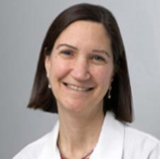Lifelong Medical Educator Dianne Wagner Retires
July 28, 2022
 When Dianne Wagner, a fourth-year medical student from Chicago, arrived at the Michigan State University College of Human Medicine in 1980 for a few months of elective rotations, she intended her stay would be temporary.
When Dianne Wagner, a fourth-year medical student from Chicago, arrived at the Michigan State University College of Human Medicine in 1980 for a few months of elective rotations, she intended her stay would be temporary.
On the geological time scale, it was.
“I moved to Michigan temporarily in 1980, I always say, and stayed 42 years,” said Wagner, MD, who retired June 1 after holding several College of Human Medicine faculty and administrative positions, the last as associate dean for undergraduate education. “I would have been crazy to leave. The college has been a gift to me.”
After graduating from the University of Illinois Abraham Lincoln School of Medicine, Wagner stayed in Michigan for her internal medicine residency. In 1984, Ruth Hoppe, MD, then chief of the college’s division of general internal medicine, offered Wagner a part-time position consisting of seeing patients, attending in a residency primary care clinic, and taking on the internal medicine clerkship directorship.
“It was a wonderful introduction to academic medicine, and it enabled me to have the balance I was looking for,” Wagner said, particularly as she was starting a family.
She left the college in 1993 to join the local health maintenance organization and, later, a Sparrow Hospital primary care medical practice, but she returned to the college in 2000 as associate director of clinical skills and problem-based learning. In 2004, she became associate dean for graduate medical education and in 2008, associate dean for collegewide assessment.
In a prelude to the latter position, she approached Marsha Rappley, MD, who was then the college’s dean, suggesting a move to emphasizing educational outcomes, judging students on the skills they could demonstrate, rather than on the hours of they had spent in their learning activities. It was a prescient move, as the knowledge gained would later help inform the college’s complete curricular transformation, which took place under the leadership of then-senior associate dean for academic affairs Aron Sousa, MD.
In 2015, Wagner became associate dean for undergraduate medical education and was given the opportunity to head the team implementing the new Shared Discovery Curriculum, a data-driven approach emphasizing clinical experience and patient care.
“That was an incredibly exciting opportunity I was given, another in a long line of gifts from the college,” she said.
She was eligible to retire in 2016, but “there was too much excitement and too much to do,” Wagner said.
She and the team – “the most brilliant, hardest working group of medical educators on the planet” – were nearly finished phasing in the new curriculum, and then came the unexpected. The COVID-19 pandemic disrupted everything, requiring the college to “lean hard into competency-based education” to fulfill its goals.
“Medical education was turned on its head,” Wagner said. “It took until early morning until late at night to figure out how we were going to deliver a quality medical education.”
Despite the challenges, “we were guided by our Shared Discovery Curriculum principles during the pandemic, and they saw us through.”
Wagner again had time to consider retirement. “It felt like the cosmos speaking,” she said. “The team was totally capable of carrying on. It just felt like it was right.”
Wagner also served as interim senior associate dean for academic affairs from November 2019 until March 2022 and retired as associate dean for undergraduate medical education on June 1.
One month into retirement, she is thinking of re-entering education at a different level, perhaps tutoring middle school students, and she would like to volunteer for an environmental organization.
“It’s open ended right now, which is completely different than how most of my life has been,” she said. “The college has given me so many gifts of opportunity and of incomparable colleagues, I feel incredibly lucky.
“For now I’m going to have the privilege of spending time with family, a truly precious gift, which I am going to savor!”

